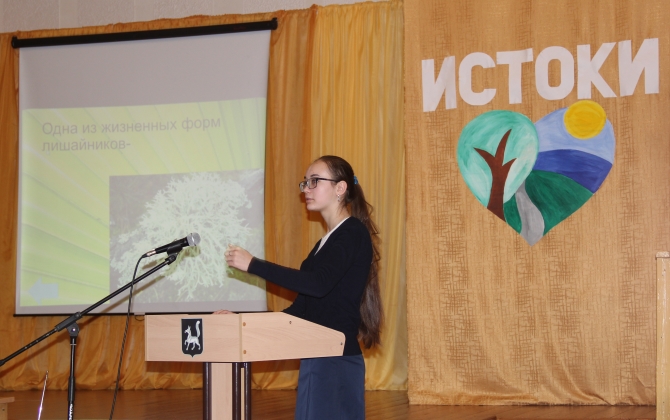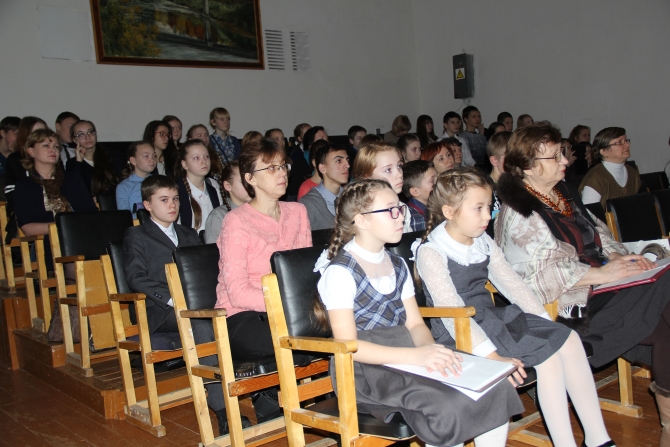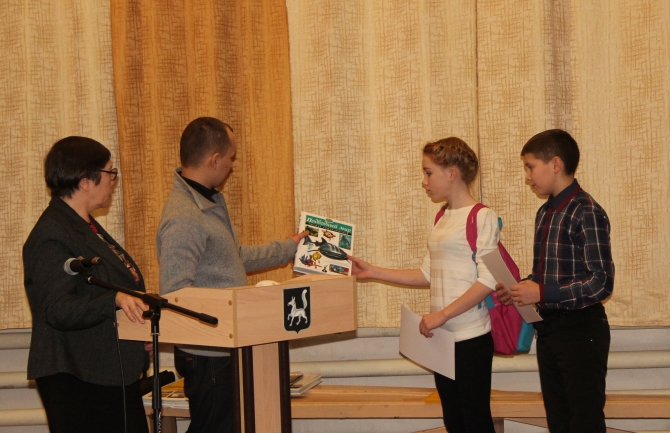The Istoki Conference: More Participants Now
The environmental and regional study conference Istoki (literally “Beginnings”) initiated for the first time as an interschool event by the Model River Mezen project in autumn 2015 in Vazhgort was held on the district level in January this year. This time it was attended by teams from Blagoyevo, Glotovo, Koslan, Mezhdurechensk, Chernutyevo schools and from the Usogorsk Children Activity Center together with students and teachers from Vazhgort and Usogorsk.
The name of the conference has a reason behind it. The nature and history of the native land, the life of the area where you spent your childhood, your family history are the beginnings which later largely define a person’s attitude to what is happening, his or her values and goals.
At the conference, schoolchildren presented the results of their research work jointly with theirteachers. It is indicative that environmental and biological topics were somehow connected with the native places, with the life of the local community, and they often used such methods of data collection as surveys among local residents, interviews of old-time residents and use of local archives.
For instance, seventh-grade students Viktor Frolov and Aleksandra Gorbunova from Vazhgort school studied meristic traits of the stone eel as an anadromous species. For this, they did more than just asked local fishermen, they also studied the real specimens of the stone eel – measured the tail end width, the large dorsal fin height, body periphery and length, number of branchial apertures, dorsal fins, weight, etc. The results of the measurements were summarized in a table and compared to literature sources thus to identify the characteristics of stone eels entering the Vashka river. The information about fishing traditions at the Vashka became an interesting part of the study…
Yury Karmanov, seventh-grade student from Usogorsk school, presented a research of the springs flowing to the Mezen. The biggest advantage of the work was that the author took interest in the topic when he was an elementary school student, so he used the time to explore not only the spring in the vicinity of his native village, but also more remotely located springs during summer trips and expeditions. That is why his work (even though it fails to describe all the springs along the Udora part of the Mezen river) abounds in data, including the information about location of springs and the landscape features, physical and chemical properties, organoleptic indicators of water in each of the springs under study, the history of their names…
Valeria Lyutoyeva, ninth-grade student from Chernutyevo, raised a hot topic, which is discussed almost every year in the New-Year period, in her study Let’s Preserve Spruce based on the survey conducted in her school and common practices of using Christmas trees in her village. While Anastasia Prokopyeva from the tenth grade of Blagoyevo school presented an environmental path near her school, where senior high school students conduct tours for younger students.
Brothers Ilya and Dmitry Dontsovs (9th and 11th grades of Vazhgort school) focused their presentation on traditional fishing tools. The subject of the research and the sources of information were materials and exhibits of the local regional study museum, stories of old-time residents, interviews with fishermen and cooperation with them right at the river.
The guys noted advantages and disadvantages of traditional fishing tools. When they were answering the jury’s questions, they showed extensive knowledge of fishing rules and the village fishing practices. You could also feel the love and commitment to the native settlement and its environment in the work by ninth-grade students Darya Korovina and Daniil Braur from Mezhdurechensk called Sweet Corner. Together with other kids from the school forestry they described all interesting natural and historical sites in Mezhdurechensk forestry and mapped them.
The jury represented by experts from the Udora district education administration, Usogorsk Children Activity Center, the Komi Republic Center of SPNA and the Silver Taiga Foundation ranked Yury Karmanov first. The work of Ilya and Dmitry Dontsovs from Vazhgort school got the second place, while the work of Viktor Frolov and Aleksandra Gorbunova from the same school became third. They were all awarded with winner diplomas and presents – an illustrated encyclopedia Wonderful Komi Republic and a book about ichthyofauna of rivers and seas. All other authors got participant diplomas and presents.
The conference also showed research works of students who participated in the Role of the River in Udora Residents’ Traditional Way of Life: History and Today contest, which was part of the Model River Mezen project, announced earlier. The work by Nikita Avramov from the seventh grade of Chernutyevo school was recognized best. Polina Lobanova, eighth-grade student from the same school, became second. And Polina Klepikovskaya, 11th grade student representing the Usogorsk Children Activity Center, who prepared the review of results of annual environmental and regional study exploratory expeditions by schoolchildren as part of the Model River Mezen project, was ranked third. The youngest participants – fourth-graders Darya Chuprova and Darina Tregoyeva (Usogorsk Children Activity Center) also presented an interesting research – they told about the role of the Mezen in the lives of their ancestors.
The conference participants learnt about the research activities of the River Patrol conducted by Vazhgort schoolchildren with the help of the Pchyolka mini express laboratory (literally translated as Bee). Andrey Bagin from the Komi Republic Center of SPNA presented the Reserved School educational program.
The Silver Taiga Foundation and the Working Group of the Model River Mezen project would like to thank all young participants of the conference and the research contest, as well as the teachers who trained the children – Irina Klishch, Valentina Avramova, Dina Chuprova, Natalya Semyonova, Tatyana Popova, Margarita Zhdanova, and Olga Todorova. We are also thankful to the staff of the Usogorsk secondary school which hosted the event.






